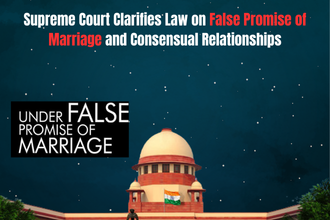In a significant judgment that raises vital questions about the intersection of personal relationships and criminal law, the Allahabad High Court has cautioned against the growing trend of converting failed romantic relationships into criminal cases. Justice Krishan Pahal, while granting bail to a 42-year-old man accused of rape, emphasized that not all socially or morally questionable conduct amounts to a criminal offence.
The case—Arun Kumar Mishra v. State of UP—highlights the increasing misuse of penal provisions, particularly in the aftermath of broken relationships. This ruling adds to the evolving jurisprudence around consent, deception, and the limits of criminal liability in intimate matters.
Case Background: From Relationship to Rape Charges
The accused, Arun Kumar Mishra, aged 42, was arrested following allegations by a 25-year-old woman. According to her complaint, Mishra had promised marriage, established a physical relationship with her, and later reneged on the promise. She further alleged that he video-recorded their intimacy and used it to blackmail her. Charges under Sections 376 (rape), 313 (causing miscarriage without consent), and 377 (unnatural offences) of the Indian Penal Code (IPC) were filed.
However, during the bail hearing, it was submitted that Sections 313 and 377 IPC had already been dropped from the charge sheet. The accused’s counsel argued that the relationship was consensual and that the FIR was filed five months after the breakup, indicating a retaliatory motive rather than genuine victimization.
Justice Krishan Pahal’s Observations
In his April 9, 2025 order, Justice Pahal made pointed observations about the societal shifts influencing legal trends. He noted:
“It is increasingly observed that personal fallouts and emotional discord are being given a criminal colour, through the invocation of penal laws, particularly in the aftermath of failed intimate relationships.”
The Court acknowledged that the relationship was consensual, non-marital, and between two adults. It underlined that both parties were aware of the accused’s marital history, including his claim of being previously married.
“While the emotional and romantic dynamics may not appear traditionally polyamorous, the relationship is consensual and involves two mature individuals.”
Changing Nature of Relationships and Legal Boundaries
Justice Pahal’s remarks reflect broader societal concerns. The Court referred to the “depleting standards” in sexual relationships and the increasing prevalence of “transient and uncommitted” romantic connections.
The judgment underlined that merely immoral or unethical conduct does not automatically attract criminal liability:
“Not all socially or ethically questionable actions warrant legal intervention. It also reflects a foundational principle in jurisprudence — the law does not enforce all aspects of morality.”
This distinction between morality and legality is a cornerstone of modern jurisprudence. The Court cautioned against judicial overreach into matters that, while emotionally charged, do not necessarily constitute criminal wrongdoing.
Arguments Presented by Both Sides
Defense Arguments:
Senior Advocate Anup Triwedi and Advocate Nitin Chandra Mishra, representing the accused, highlighted:
- The consensual nature of the relationship.
- The delay of five months in filing the FIR.
- The fact that the complainant, a well-educated woman, continued to travel and maintain the relationship.
- The dropped charges under Sections 313 and 377 IPC.
They argued that while the act may be deemed immoral by societal standards, it lacked the criminal intent or force necessary to classify it as rape or blackmail.
Prosecution Arguments:
Advocate Devendra Singh, representing the complainant, portrayed the accused as a habitual deceiver:
- Referred to the accused as a “Casanova”.
- Claimed he used his wealth and influence to exploit women.
- Alleged that the accused had been married multiple times and had children with different women.
Advocate Sunil Kumar, representing the State, supported the prosecution’s version.
Court’s Rationale for Granting Bail
Weighing the arguments and the evidence, the Court ruled in favor of bail. Key factors influencing this decision included:
- The consensual nature of the relationship.
- The significant delay in filing the FIR.
- The educational background and maturity of the complainant.
- Absence of credible evidence indicating coercion or force.
- Deletion of serious charges from the original FIR.
“The instant case may fall within the category of immorality, but it cannot be termed as penal… it does not necessarily violate any law that prescribes a legal punishment.”
The Court added that the timing of the complaint suggested a retaliatory intent rather than a pursuit of justice, which further undermined the credibility of the allegations.
Wider Implications: Misuse of Rape Laws?
This ruling reopens the contentious debate around Section 376 IPC and the criminalization of failed relationships. Indian courts have repeatedly stressed that a breach of promise to marry—without malicious intent—cannot automatically be deemed rape. However, misuse of this provision continues to be a pressing concern, often putting innocent persons through prolonged litigation and incarceration.
Justice Pahal’s judgment aligns with earlier decisions that recognize the importance of discerning the nature and intent behind intimate relationships. It urges judicial officers to avoid criminalizing relationships where consent was freely given by both parties, unless clear evidence of fraud or coercion is presented.
Conclusion: Drawing the Line Between Crime and Consent
The Allahabad High Court’s decision in Arun Kumar Mishra v. State of UP serves as a critical checkpoint in the ongoing evolution of India’s criminal law regarding sexual relationships. It cautions against turning every emotional fallout into a criminal case and upholds the principle that not every wrong deserves legal punishment.
As Indian society grapples with changing norms in romantic and sexual relationships, the courts are being increasingly called upon to distinguish genuine cases of exploitation from those born out of emotional distress or revenge. This judgment reinforces that the law must protect genuine victims while safeguarding against its misuse.


